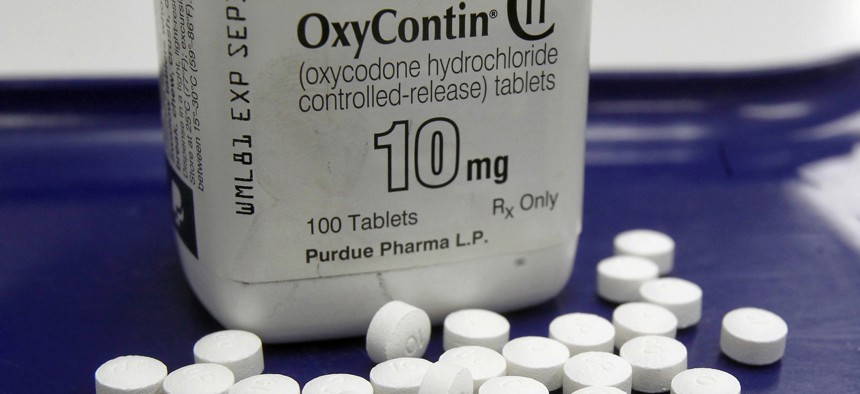To Raise Money to Combat Opioid Addiction, One State Hikes Licensing Fees for Drug Companies

Toby Talbot/AP Photo
A new Minnesota law will increase prescription opioid manufacturer licensing fees from $235 to $55,000 and is expected to generate about $20 million that will fund the state’s opioid prevention and treatment strategies.
Hundreds of state and local governments have sued drug distributors and manufacturers in efforts to recoup costs associated with battling the opioid crisis. But as the litigation and complicated settlement discussions play out, some states are turning to other strategies to collect fees from pharmaceutical companies in order to finance drug addiction programs.
In Minnesota, first-of-its-kind legislation to raise drug companies’ licensing fees to pay for an opioid stewardship fund took effect July 1. The law increases the application and renewal fees for pharmaceutical distributors and manufacturers that sell prescription drugs in the state, most notably raising the fees for manufacturers of opioid drugs from $235 to $55,000. It is expected to generate about $20 million a year that will be earmarked for the state’s opioid-related response strategy and related programs.
Drug distributors and manufacturers of non-opioid drugs would pay $5,000 a year and companies that sell or distribute more than 2 million units of prescription opioid drugs will now be required to pay an additional $250,000 fee.
“The opioid epidemic has devastated every corner of our state and left heartbroken families in its wake” said Minnesota Governor Tim Walz at a bill signing held July 1. “We cannot tackle this crisis with a one-size-fits-all solution. That’s why this law builds on the work of local providers and programs across Minnesota to craft the innovative solutions our communities need to combat addiction.”
Approximately 130 people die each day in the United States from opioid-related overdoses. In Minnesota, 422 people died of opioid overdoses in 2017. Of those deaths, 195 were attributed to prescription drugs and the rest to either synthetic opioids or heroin.
Drug distributors and manufacturers sent more than 570,000 grams of oxycodone and 182,000 grams of hydrocodone to Minnesota in 2017, according to the Drug Enforcement Administration's latest annual data from its Automated Reports and Consolidated Ordering System.
The new fees will pay for the state to develop and implement a comprehensive strategy to address the opioid addiction and overdose deaths by funding prevention, treatment and research efforts. The law established an 18-person advisory council to assess the state’s response to the opioid crisis, set priorities going forward, and make grant recommendations. The advisory council is required to be up and running by October 1.
If Minnesota receives a large sum of money through its opioid litigation efforts, the law requires a reassessment and reduction of the drug company fees.
Pharmaceutical companies opposed the legislation, arguing that it could lead to higher drug prices for patients who legitimately need opioid medications. The Healthcare Distribution Alliance, an association representing drug distributors, said efforts to address the opioid crisis should instead focus on reducing overprescription of commonly abused drugs and the growing use of illicit drugs like opioids like heroin and fentanyl.
“While we understand and appreciate the intent of the Minnesota Legislature to do something to address opioid abuse, we remain concerned that efforts to increase fees or discriminatory tariffs will only make it more difficult and more costly for patients and providers to access medicines,” the HDA said in a statement issued after the law’s passage.
Minnesota’s law appears to be the first to fund opioid addiction treatment efforts through drug company licensing fees, but advocates involved in the law’s passage say lawmakers in other states have expressed interest.
“We have twenty different states that we’re helping to pass similar legislation, because what we did here is a first,” said Lexi Reed Holtum, the executive director of the Minnesota-based Steve Rummler HOPE Network, a nonprofit founded after the death of her fiance’s fatal opioid overdose.
Other states, including New York, Delaware and Rhode Island, have considered measures to tax prescription opioids in order to fund opioid addiction treatment and prevention efforts. Critics in those states have also raised concern that the taxes would raise prescription drug prices.
Andrea Noble is a staff correspondent for Route Fifty.
NEXT STORY: The Detested Bradford Pear Tree Is Coming to a Forest Near You





